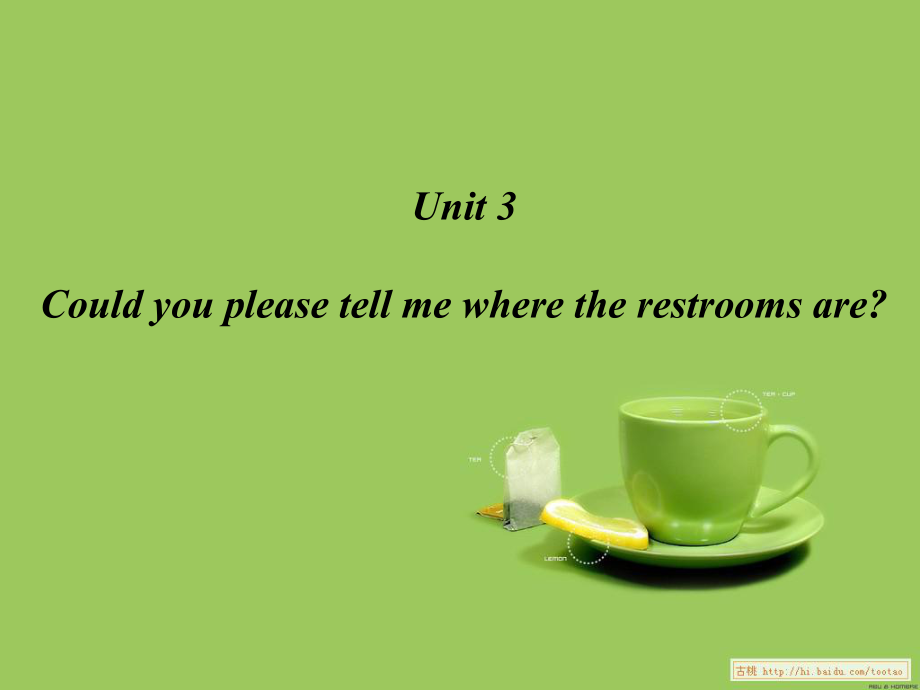《unit3 Could you please tell me where the restrooms are 復(fù)習(xí)知識(shí)點(diǎn)總結(jié)》由會(huì)員分享��,可在線閱讀�,更多相關(guān)《unit3 Could you please tell me where the restrooms are 復(fù)習(xí)知識(shí)點(diǎn)總結(jié)(15頁(yè)珍藏版)》請(qǐng)?jiān)谘b配圖網(wǎng)上搜索。
1�、Unit 3 Could you please tell me where the restrooms are?洗手間, 公共廁所在旁邊, 在附近浴室建議 v. n.中心的�,中央的東方的便利的�, 方便的禮貌的adj.adv. restroom beside bathroom suggest suggestion central east convenient politepolitely正確的講(某種語(yǔ)言)的人, 發(fā)言者不禮貌的地址課程�,學(xué)科郵票原諒倉(cāng)促, 急促 要求�,請(qǐng)求 correct speaker impolite address course stamp pardon rush re
2、quest取錢買一些雜志/郵票獲取一些有關(guān)小鎮(zhèn)的信息 買一雙鞋 買一份報(bào)紙買一本字典 買一些有票吃飯?jiān)鯓拥竭_(dá)沿著get some moneyget/buy some magazinesget some information about the townget/buy a pair of shoesbuy a newspaperbuy a dictionarybuy some stampshave dinnerhow to get to spgo along/ go down在銀行的旁邊在右邊在某人的右邊去三樓向左轉(zhuǎn)在之間 走過書店做激動(dòng)從/以開始不必匆忙beside the bankon t
3�、he righton one s rightgo to the third floorturn leftbetween andgo past the bookstorebe excited to do sth.start/ begin withnot need to rush請(qǐng)?jiān)僬f一次 抓住某人的手 起初 在去.的路上經(jīng)過、路過沿 . 走�;走上;走近在那個(gè)時(shí)刻來得更早點(diǎn)占位子pardon mehold one s handat firston one s way to. pass bywalk upat that timecome a little earlierget a table一些吃的
4�、東西最近的銀行尋求幫助取決于/依靠停車一個(gè)地下停車庫(kù)換錢在一個(gè)說英語(yǔ)的的國(guó)家期待醒來使想起 一個(gè)吃飯的好地方something to eatthe nearest bankask for helpdepend onpark one s caran underground parking lotchange money in an English-speaking countrylook forward to+n./doingwake upremind ofa good place to eat_Excuse me ,could you please tell me where the rest
5、rooms are?請(qǐng)您告訴我洗手間在哪里好嗎�?could you please.?意為“請(qǐng)你。好嗎�?”,是表示請(qǐng)求的禮貌用語(yǔ)�,后接動(dòng)詞原形。其否定形式是在please后加not�。 -Could you please turn off the lights? -Sure, I can.歸納拓展歸納拓展:表示請(qǐng)求時(shí)可用can, could ,may, might表達(dá),它們沒有時(shí)態(tài)上的差別�,只是could比can,might比may在語(yǔ)氣上要客氣�。Could/Can you lend me some money, please?對(duì)could you please.?句型回答時(shí),肯定回答可用sure
6、./certainly./of course.等�;否定回答可用sorry, I cant./sorry ,Im afraid not.等。 -Could you please open the window? -Of course. /Sorry, I cant. Because the windows are locked on the train.例:例:1.-Could you please _the window? -Sure, I_.A.open not, could B. not open, could C. not opening ,can D. not open ,can 2.
7�、-Could you go shopping with me? -_. My father and I will go to Wuhan tomorrow. A.I think so B. Yes, I hope so C. Im afraid so D. Sorry, Im afraid not 3.-Did you have a good weekend?-_.We enjoyed ourselves in an amusement park.Im afraid not B.I dont think so C. Of course D.I hope notinterested, inter
8、est和和 interesting interested是形容是形容詞�,詞,意味意味“感興趣的感興趣的”�,主語(yǔ)通常是,主語(yǔ)通常是人�,多用于人,多用于be/get/feel/become interested in結(jié)構(gòu)中�。結(jié)構(gòu)中。 Im interested in history .interest用作名詞時(shí)意為用作名詞時(shí)意為“興趣�,趣味興趣,趣味”�;用作動(dòng)詞時(shí);用作動(dòng)詞時(shí)意為意為“使(人)產(chǎn)生興趣使(人)產(chǎn)生興趣”�,其主語(yǔ)多為事物。�,其主語(yǔ)多為事物。 interest sb. have / create an interest in 名勝古跡名勝古跡 places of interestint
9�、eresting是形容詞,意為是形容詞�,意為“有趣的有趣的”。作表語(yǔ)時(shí)�,主。作表語(yǔ)時(shí)�,主語(yǔ)通常是物。作定語(yǔ)時(shí)�,既可修飾人,也可修飾物�。語(yǔ)通常是物。作定語(yǔ)時(shí)�,既可修飾人,也可修飾物�。 Thats an interesting storybook for children. 例:例:We all love Miss Wang. She always makes her English class very_. A. interest B. interests C. interesting D .interestedI have _ to tell you. Maybe you will be _
10、in it.A. interesting something; interested B. something interesting; interestingC. something interesting; interested D. something interested; interesting 特殊疑問詞引導(dǎo)的賓語(yǔ)從句特殊疑問詞引導(dǎo)的賓語(yǔ)從句賓語(yǔ)從句的連接詞賓語(yǔ)從句的連接詞 特殊疑問詞引導(dǎo)賓語(yǔ)從句時(shí)�,從句的連接詞由該特殊疑問句的特殊疑問詞引導(dǎo)賓語(yǔ)從句時(shí),從句的連接詞由該特殊疑問句的疑問詞充當(dāng)�。特殊疑問句的疑問詞通常有疑問代詞疑問詞充當(dāng)。特殊疑問句的疑問詞通常有疑問代詞what, w
11�、hich, who, whose和疑問副詞和疑問副詞where, when, why, how等。等�。 He wondered what had happened to her. Could you tell me how I can get to the hospital?賓語(yǔ)從句的語(yǔ)序賓語(yǔ)從句的語(yǔ)序 特殊疑問句作賓語(yǔ)從句時(shí),不管主句是陳述句還是疑問句�,從特殊疑問句作賓語(yǔ)從句時(shí),不管主句是陳述句還是疑問句�,從句都是用句都是用“連詞連詞+陳述句語(yǔ)序的句子陳述句語(yǔ)序的句子”,句末是否用問號(hào)由主句�,句末是否用問號(hào)由主句來定。主句是陳述句時(shí)�,句末用句號(hào)�;主句是疑問句時(shí)�,句末用來定。主句是陳述句時(shí)�,句
12、末用句號(hào)�;主句是疑問句時(shí),句末用問號(hào)�。問號(hào)。 Where does Mr. Liu live? Do you know?- -Do you know where Mr.Liu lives?賓語(yǔ)從句的時(shí)態(tài)賓語(yǔ)從句的時(shí)態(tài)例:例:1.The teacher asked the students_. A. if they were interested in dinosaurs B. when was Albert Einstein born C. what they will do with the computers D. how many trees they have planted 2. We dont know_ their parents are. A .that B. what C .why D. which 3 .I know_ I promised to take you to dinner, but I wont finish working until ten oclock. A. that B. what C. why D. if
 unit3 Could you please tell me where the restrooms are 復(fù)習(xí)知識(shí)點(diǎn)總結(jié)
unit3 Could you please tell me where the restrooms are 復(fù)習(xí)知識(shí)點(diǎn)總結(jié)

